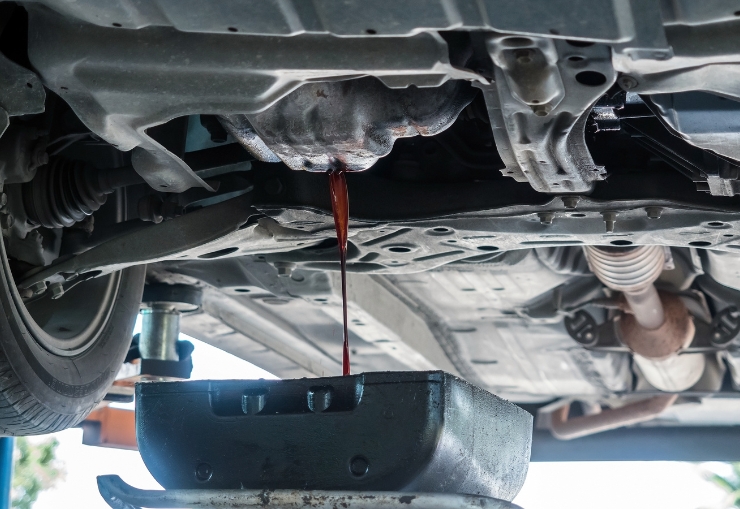One commonly overlooked issue is oil sludge, which can destroy your engine. To keep your car running in top shape with low maintenance, it is necessary to know how to recognise what oil sludge is, why it forms and the harm it can cause. Here’s a detailed account of what a sludge oil can do and how does it hurt a vehicle.
What is in Oil Sludge?
The oil content of oily sludge ranges from 6.43% (OS3) to 10.5% (OS2). In an engine, oil sludge is a gelatinous substance that generally develops in the oil passages and components of a car engine. Various things make oil sludge
- Oxidised Oil: After a while, engine oil deteriorates due to heat and chemical interactions, and as it breaks down, oxidised oil forms, which makes up a large component of sludge.
- Impurities: Oil-based particles such as dirt, metal fragments, carbon deposits and other waste products slowly enter the oil path to build up sludge.
- Water: If water mixes with engine oil from condensation or a coolant leak, it can cause the sludge to build up, requiring car engine repair.
This stuff acts like glue, and when you combine all these elements together, it turns into that sticky, gooey black tar. It jams up oil flow and damages your engine performance.
What is the Cause of Oil Sludge?

Some factors create a quite good environment for the formation of oil sludge. So, oil sludge mainly happens for the following reasons :
1. Poor Maintenance
The leading cause of sludge is ignoring regular oil changes. Detergents & dispersants suspended in the oil keep contaminants suspended, stopping them from settling and causing sludge. When oil changes are skipped, these contaminants remain inside the engine and can be collected as sludge.
2. Low-Quality Oil
Additionally, using poor-quality or wrong engine oil could cause sludge to form faster. Cheaper oils may not have the right additives to fight crud, while wrong oil grades can deteriorate sooner at high temperatures.
3. Frequent Short Trips
Engines are manufactured to reach the right temperature, which helps remove moisture and other deposits. Never reaching that temperature on frequent short trips would result in condensation, which mixes with the oil and sins against you as sludge.
4. Engine Overheating
If the engine is overheated, it would speed up the oil breakdown, allowing sludge to form. It can substantially increase your risk of sludge if you run your engine at high temperatures all the time.
5. Internal Leaks
Coolant or fuel can also leak into the oil system, carrying contaminants that encourage sludge development. The gasket failures and other mechanical issues within the engine can cause oil leaks.
How Oil Sludge Harms a Car
Oil sludge can lead to various problems in your car, from minor inconveniences to severe engine damage. Oil sludge can cause some of these car problems –
1. Restricted Oil Flow
Oil sludge is bad news because it can get into passageways and gunk up filters, starving your engine of vital lubrication. Without this lubrication, engine parts create too much friction, decreasing performance and potentially even engine failure.
2. Overheating
Sludge building up can block the cooling system, leading to an overheating motor. It tends to warp engine components and blow head gaskets. Even any other issue will likely be costly if repair is needed.
3. Reduced Fuel Efficiency
A sludge-laden engine will use more fuel as it must work harder to operate. As a result, you may find a reduction in fuel economy, meaning more stops at the petrol station.
4. Engine Knocking and Noise
The hydraulic lifters and other components become noisy, which can be heard because the engine oil sludge provides inadequate lubrication. In addition, a knocking sound can be heard from the engine if no oil gets pumped up there.
5. Engine Failure
Motor oil sludge can even lead to total engine failure in extreme cases. Sludge can block oil flow, meaning oil never reaches critical engine parts, and these parts may seize up and fail, which can mean an extensive engine rebuild or replacement.
In Conclusion
Oil sludge can lead to serious car problems and a decreased lifespan. It is necessary to understand the causes and effects of proper car maintenance. Suppose you suspect your car is experiencing oil sludge. In that case, you must have it inspected by mechanical repair services to make sure it has everything required to stay healthy. The way around this is to ensure you keep up with your regular maintenance and use only high-quality oils.
FAQs
1. How can I prevent oil sludge from forming in my engine?
Preventing oil sludge requires regular maintenance (responsibly timing your oil changes and running good-quality oils and filters). You can also avoid frequent short trips and ensure that your engine reaches its optimal operating temperatures. Ensuring you use the right grade of oil and follow your maintenance schedule is key to preventing sludge.
2. What are the symptoms of oil sludge in an engine?
Some signs that oil sludge has developed include sluggish engine performance and engine overheating. If you notice any signs mentioned here, your next step should be to sign up for an auto mechanic service.
3. Can oil sludge be removed, and how?
While oil sludge can be removed, it typically requires a laborious process. A car mechanic will use chemicals to remove the sludge and properly flush the engine oil system between the repairs. In a worse scenario, the engine part must be removed and cleaned manually. These interventions are avoidable through regular maintenance and the use of good-quality oils.
